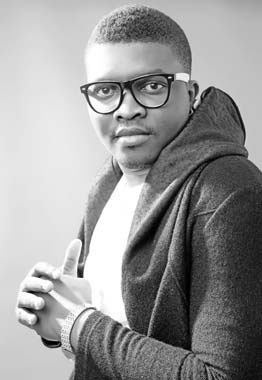Revolutionary singer is red-hot
Updated: 2014-03-23 08:19
By Li Aoxue(China Daily)
|
|||||||||
The Internet has made the term "overnight success" redundant. Now fame can come in minutes, not hours. Just ask Stephen Uwechue.
The 29-year-old Nigerian singer's dream of a successful career in China took off in 2011 when his first attempt at singing a red song in praise of late Chairman Mao Zedong quickly attracted a million hits on the Internet.
Suddenly, the Nigerian was famous for singing classic Chinese revolutionary songs in what to him was still a strange language.
"He can sing about 50 Chinese red songs now, and that's more than most Chinese can sing," Yu Xin, Uwechue's manager, says.
Uwechue is now the lead singer of Wuzhou Zuhe, one of China's most popular bands. The Beijing-based pop group consists of five people from five continents.
Chinese red songs are about the Communist revolution that led to the formation of New China in 1949. The songs praise late Chairman Mao, the Communist Party of China and the soldiers and citizens of the revolution. They are classics of modern China that vividly depict the tragedies and triumphs of those revolutionary times.
Uwechue became aware of red songs by accident. In 2011, when the nation was celebrating the 90th anniversary of the formation of the CPC, millions of people all over China were singing those patriotic songs.
Yu saw a good opportunity for Uwechue and encouraged him to learn some of the songs. The young Nigerian soon fell in love with the songs as they helped him learn more about Chinese culture and history.
"Many red songs tell stories about the revolution and mention many place names, so I learned a lot by singing them," Uwechue says.
"In Africa we don't have such music and it took me a lot of time to learn how to sing them."
Before he learned about the background to these songs, Uwechue once made a cultural faux pas by adding a few Michael Jackson-style dance steps to a performance at a singing competition.
"One judge gave a stern criticism of my performance, and told me to do some study on the background of the song," Uwechue says.
To better understand red songs, Uwechue would try to watch a video of any song he was learning. Whenever he came across something he did not understand, he asked one of his Chinese friends to explain it to him.
In 2001, Uwechue entered a red song competition in Jiangxi province. He came in sixth out of about 200 competitors.
Uwechue came to China in 2008, following his older brother. Emmanuel Uwechue was already well known in China as he had sung on many Chinese TV shows, including the Spring Festival Gala. His brother's success convinced Uwechue to try his luck in China.
He says it took him six years to learn to adapt his natural style to suit Chinese songs, but now prefers local songs and rarely sings in English.
Uwechue has about 20,000 followers on Sino Weibo, China's biggest micro-blog site, and came fourth on Star Boulevard, one of China's most popular grassroots talent shows.
Fascinated by Chinese culture, Uwechue has also learned some songs from classical Chinese operas.
With a pastor father, Uwechue grew up surrounded by church music. He fell in love with music at a young age.
By the age of 10, Uwechue had joined the church choir and was performing onstage. Later he sang at weddings and in bars. And in 2008 he followed his brother to China to pursue his dream of a singing career.
liaoxue@chinadaily.com.cn
|
Stephen Uwechue says the more he learns about Chinese culture, the more comfortable he will feel here. Provided to China Daily |
(China Daily 03/23/2014 page5)
